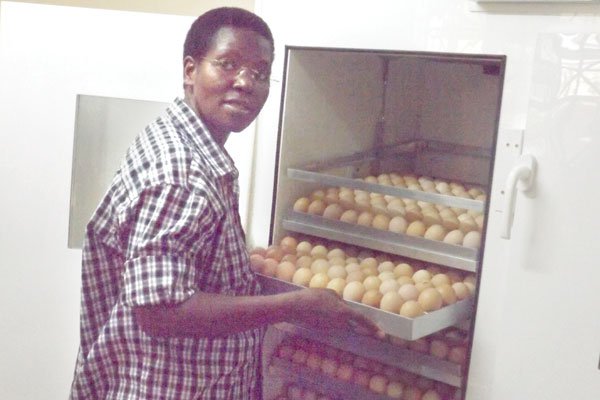Jane Onyango is a determined to become a renowned poultry farmer in Western Kenya. She says what she started as a hobby is already paying off, fetching an average monthly income of Sh40,000.
The farmer, who hails from Wagayi Village in Awendo, Migori county, says her journey in poultry keeping began in January 2014 as a small-scale venture.
This journey started after she acquired three indigenous chicken— two hens and a cock— as gifts from her maternal grandmother, valued at Sh. 1, 800.
“An inspiration from my grandmother made me venture into small-scale poultry keeping with the aim of earning some pocket money,” she says.

Determined, Onyango took care of the birds and the stock gradually grew to 168 birds. She then added 30 Indian Rainbow rooster chicken variety, 24 hens and six cocks to the stock.
This Rainbow Rooster is a hybrid chicken variety, which is a crossbreed of two high-yielding Indian chicken breeds. With the new stock, Onyango was now in the business of producing and rearing chicks for sale.
She bought a 48 egg capacity incubator with the proceeds and engaged in more serious poultry business.
A year later, Onyango acquired more indigenous and hybrid birds and another 260-egg capacity incubator. “Because of the high demand for chicks locally, I increased production and the profit was worthwhile,” says Onyango. “I produced 150 chicks per month on average which, to me, was a good start,” she says.
In October 2015, her poultry farm, now dubbed Jane Jann Farm exhibited at the Migori Agricultural Show and got a massive boost in popularity.
“I got a bigger market from our display at the show, which culminated in the purchase of a new, 2,200- egg capacity incubator in January. The larger incubator meant more eggs, so I had to source eggs locally,” she says with a smile.
On average, the farm sources up to 15 trays of eggs at a cost of Sh750 each per week. The eggs are loaded into the waiting incubators for the incubation process, which takes 21 days; 19 days in the incubator and another two days at the hatchery stage.
“The new chicks are transferred into a brooder for a maximum of three days before they can be sold,” she says
A day-old chick goes for Sh120 while a one-month-old sells at Sh420, with potential markets being poultry farmers in Migori and neighbouring counties. Each batch can now produce at least 300 chicks. Any unsold chicks are left to grow to maturity at the farm.
“After hatching, the chicks are fed on unga products and chick mash, but are introduced to growers mash at eight weeks,” she says. Business is flourishing and she anticipates to double production to 600 chicks a month.
“Looking at my projections, my expectations are quite big,” says Onyango. “I aim at making profits to the tune of Sh100, 000 per month by the year-end,” adds Onyango.
The proud farmer says farming is profitable as she has made strides in both personal and family development. Three workers now help her in the farm, boosting the local economy.
Still, the high cost of poultry feeds is a major challenge. She advises prospective farmers to start with the little seed capital they might have and not wait to gather more resources.
“Start with an idea in farming irrespective of how uncomfortable it may be at the beginning,” says Onyango.








Thanks to unga group.for their good products .can I acc